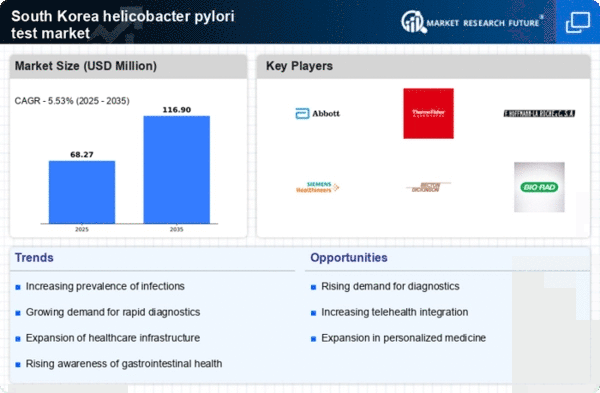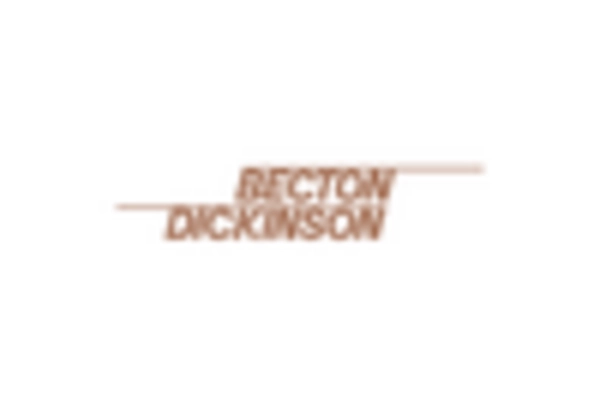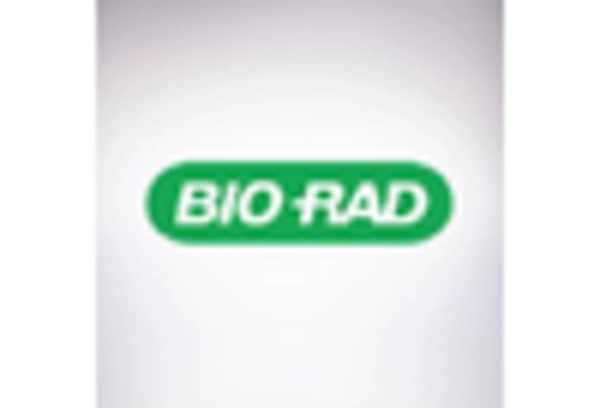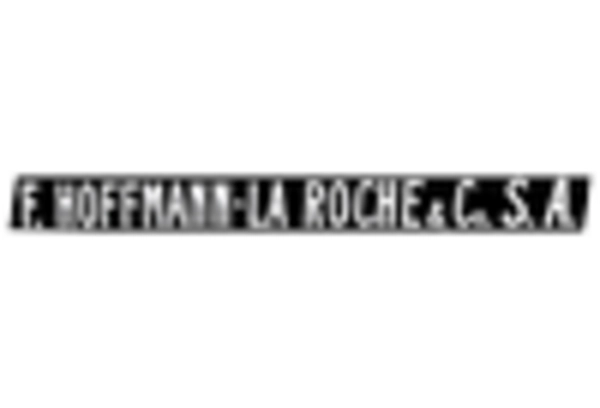Growing Healthcare Expenditure
The increase in healthcare expenditure in South Korea is a significant driver for the helicobacter pylori-test market. With the government and private sectors investing more in healthcare services, there is a greater emphasis on preventive care and early diagnosis. In 2025, healthcare spending is projected to reach approximately 9.5% of GDP, reflecting a commitment to improving health outcomes. This financial support enables healthcare facilities to adopt advanced diagnostic technologies and expand testing capabilities. Consequently, the helicobacter pylori-test market stands to gain from this trend, as more resources are allocated towards the detection and management of H. pylori infections. Furthermore, increased funding for public health campaigns may enhance awareness and encourage individuals to seek testing, further driving market growth.
Support from Healthcare Policies
Supportive healthcare policies in South Korea are playing a pivotal role in shaping the helicobacter pylori-test market. The government has implemented various initiatives aimed at improving gastrointestinal health, including guidelines that recommend routine testing for at-risk populations. These policies not only facilitate access to testing but also encourage healthcare providers to prioritize H. pylori screening. As a result, the helicobacter pylori-test market is likely to experience growth driven by increased testing rates and improved patient outcomes. Furthermore, the establishment of reimbursement policies for diagnostic tests may alleviate financial barriers for patients, making testing more accessible. This supportive regulatory environment is expected to foster innovation and investment in the market, ultimately benefiting public health.
Advancements in Diagnostic Technologies
Technological innovations in diagnostic methods are significantly influencing the helicobacter pylori-test market. The introduction of non-invasive testing methods, such as breath tests and stool antigen tests, has made it easier for patients to undergo screening. These advancements not only enhance patient comfort but also improve the accuracy and speed of diagnosis. For instance, the sensitivity and specificity of these tests have reportedly reached over 90%, making them reliable options for healthcare providers. As a result, the helicobacter pylori-test market is experiencing a shift towards these advanced diagnostic solutions, which are expected to capture a larger share of the market. Additionally, the integration of digital health technologies, such as telemedicine, may further facilitate access to testing and treatment, thereby expanding the market's reach.
Rising Demand for Preventive Healthcare
The shift towards preventive healthcare is becoming increasingly prominent in South Korea, significantly impacting the helicobacter pylori-test market. As individuals become more health-conscious, there is a growing preference for early detection and management of potential health issues. This trend is reflected in the increasing number of health check-ups and screenings being conducted across the population. The helicobacter pylori-test market is likely to benefit from this cultural shift, as more people seek out testing as a proactive measure against gastrointestinal diseases. Additionally, healthcare providers are promoting routine screenings for H. pylori, particularly among high-risk groups, which may further enhance market demand. This focus on prevention aligns with broader public health goals and is expected to sustain growth in the testing market.
Increasing Prevalence of Helicobacter Pylori Infections
The rising incidence of Helicobacter pylori infections in South Korea is a crucial driver for the helicobacter pylori-test market. Studies indicate that approximately 50% of the population may be infected, leading to a heightened demand for effective diagnostic testing. This trend is particularly concerning given the association of H. pylori with various gastrointestinal disorders, including peptic ulcers and gastric cancer. As awareness of these health risks grows, healthcare providers are increasingly recommending testing, thereby propelling market growth. The helicobacter pylori-test market is likely to benefit from this increasing prevalence, as more individuals seek diagnosis and treatment options. Furthermore, public health initiatives aimed at educating the population about the risks associated with H. pylori infections may further stimulate demand for testing services.
















